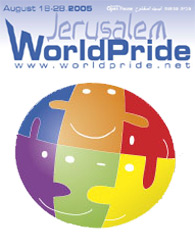Mixed emotions for gay Catholics as Pope dies
Many gay Catholics worldwide are reflecting with mixed emotions on the life and legacy of Pope John Paul II, 84, who had staunchly opposed gay rights and same-sex marriage, and the use of condoms as birth control or to curtail the spread of AIDS.

The pope called homosexuality "evil," and in the latter years of his papacy, John Paul exerted significant political pressure against gay rights and any form of secular recognition of gay relationships, from domestic partnerships to civil unions and marriage. The Catholic Church, under John Paul II, argued not only that homosexuality is against natural law, but that gays should have no protections under civil law either. The Vatican issued a letter to bishops in 1992 urging them to oppose gay rights initiatives.
In Memory & Identity, published in March 2005, the Pope wrote: "It is legitimate and necessary to ask oneself if [gay marriage] is not perhaps part of a new ideology of evil, perhaps more insidious and hidden, which attempts to pit human rights against the family and against man."
The pope pressured the Italian government to withdraw support for the World Pride Celebration in Rome in 2000. The pope also supported the Federal Marriage Amendment to the U.S. Constitution, to limit marriage to opposite-sex couples and asked bishops in America to become involved in campaigns against same-sex marriage.
AIDS activists say that by traveling to Africa and speaking against the use of birth control and condoms, the pope set back efforts to curb spread of the disease and that many have died because of the pope's theological rigidity and opposition to condom use.
He also attempted to scapegoat homosexual priests for the church sex abuse scandals, according to Sam Sinnett, president of Dignity USA, a group for gay Catholics.
While many gay advocates expressed hope that the next pope will develop more progressive positions on sexuality, 114 of the 117 Cardinals who will decide on a replacement were appointed by John Paul II, and many doubt that any major doctrinal changes are on the horizon.
POST/READ COMMENTS
Protesters oppose jailing of Aussie in Fiji for gay sex
Protesters on Monday urged the federal government to help an Australian man jailed in Fiji for having gay sex with a local man. The small group of protesters gathered outside the Fijian consulate in Sydney to picket against the jailing of former Australian university lecturer Thomas McCoskar. The 55-year-old academic was last week sentenced to two years' jail for having consensual sex with Dhirendra Nandan in Nadi, Fiji.
Australian Greens Senator Kerry Nettle, who joined the small group of protesters, said anomalies between the Fijian constitution and the legal system were responsible for the unfair jail term.
"The constitution stipulates that you can't discriminate on the basis of sexual orientation but at the same time they have laws that outlaw gay sex," she said. "We are calling on both the Fijian government and the Australian government to do something about repealing anti-gay laws in Fiji," Senator Nettle said. She said the Greens would take steps to have McCoskar brought back to Australia to serve out his sentence if necessary but an appeal was likely. She added that the Australian government should do more to uphold international standards on civil and political rights.
Gays are different: Aussie immigration minister
Australian Immigration Minister Amanda Vanstone has conceded that gay couples entering Australia on temporary visas are treated differently from heterosexual couples under immigration laws. She said that the discrimination came about because gay couples were not recognised as a family.
Senator Vanstone said she accepted the situation between heterosexual and homosexual couples differed but her office said there were no plans to change the law.
Same-sex partners of permanent residents and citizens are however recognised as partners under immigration laws.
"It's different because the visa structure was set up to accommodate families and at this point in Australia we don't recognise gay couples as being a family in the same sense as we do a husband and wife, maybe with kids," she told ABC radio.
She said some gay couples had addressed the anomaly by entering Australia on a tourist visa with their partner who held a temporary work visa and then applied for a separate working visa.
"That is different (to heterosexual families), I accept that," she said. "And I think it's a difficult proposition either way because as I say we don't recognise homosexual couples as being a family and that's the way the immigration system in relation to families is structured so it's not an easy situation, I accept that."
Organisers determined to have int'l gay festival in Jersusalem despite religious opposition

The WorldPride festival, last held in Rome in 2000 where it attracted thousands, is to include street parties, workshops and a gay film festival and is hotly opposed by Muslim, Orthodox Jewish and Christian groups. Jerusalem police spokesperson Shmuel Ben-Ruby said last week that police had received a number of requests not to issue a permit for the festival but had not yet made a decision. A rare alliance of senior Jewish, Christian and Muslim clerics held a news conference demanding the festival not be held in Jerusalem, describing gays as lower than animals and calling their lifestyle unnatural and unhealthy.
Jerusalem WorldPride 2005 will be the second WorldPride event ever held. The first was in Rome WorldPride 2000.
"WorldPride in Jerusalem is important for the Pride movement," said InterPride co-president Suzanne Girard. "We want to send a clear message out to the world that our struggle transcends borders and encompasses all faiths. Through this celebration, we wish to embrace all world communities in the search for recognition and acceptance."
POST/READ COMMENTS
